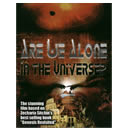Are there Other Earths?
The universe plays host to a surprising number of planets that appear quite similar to our own. Is it possible that humans could occupy any of these planets in the future? Remarkably, recent astronomical discoveries have pinpointed thousands of potential candidates. The engrossing documentary Are There Other Earths? examines the probable conditions on a handful of these planets and their parallels to the place we call home.
For a planet to be inhabitable by humans, it must rotate around a parent star much like our Sun, be temperate and shows signs of liquid water on its surface. Many possess a rocky landscape much like our own. Each of the planets profiled in the film meet this minimal criteria, but they still pose serious obstacles for human sustainability.
The film calls upon the efforts of several of the most revered observatories in the world, including NASA and the La Silla Observatory in Chile.
Their most recent discovery is the TRAPPIST-1 planetary system, a dwarf star around which seven planets rotate in close proximity to one another. Nearly 40 light years away, the star is significantly less luminous and massive than our own Sun, but at least three of its host exoplanets exist within a habitable zone. One of these planets - TRAPPIST-1f - is close to Earth's size and is thought to contain 20% liquid water content.
There's Ross 128b, a planet that orbits its red dwarf star once every 9.9 days as it inches ever closer to Earth. Almost 500 light years away lies Kepler 186f, a planet distinguished by a size, gravity and terrain much like Earth. In these instances and others, the conditions might exist that would allow biological processes to flourish. They may already harbor life forms of their own, which would finally resolve the question of whether we are alone in the universe.
The notion that humans can truly thrive on any of these exoplanets is more than a bit far-fetched at this stage. Each of them presents its own set of potential dangers and uncertainties. Regardless, Are there Other Earths? offers an intriguing glimpse into an alternate reality that might await humankind tens of thousands of years into the future.
Directed by: David Sky Brody




The background music makes this documentary garbage
Got to be brain dead to sit through the whack music playing through this nonsense
Not true
The background noise so distracting it made me quit 8 minutes in.
Whoever thought it was appropriate should be fired.
I couldn’t get too far in watching, I wanted to hear the narrator but couldn’t because of the background noise (the music, beeps n background noise were extremely unnecessary!, who’s call was that?????, not cool at all!) Is it possible to get a transcript because I’d love to know what’s being said
Generally interesting and informative. I liked that they explained some of the ways exoplanets are found and how we know what we do know about them. Some glitches like the graphic of Proxima b while talking about Trappist-1, as noted by another viewer. I think music is better used for occasional effect instead of as a constant background drone.
another so called doc of edited ESO/ESA/NASA etc. stock footage. not badly written but AI narration. Cold and unimaginative. total cost about to make, nada. Could've at least paid for a decent narrator.
In the part about Trappist-1, after the 21:00 mark, the video is about Proxima b. Major bug!
It's becoming a PKD world.
I agree. Music is unnecessarily distracting. Better if it weren't so loud.
I guess you dont like the music Richard(?) thats probably why its a distracton to you.
I like the music and the woman narrator voice sounds nice and clear too to me,
The musical element is a distraction and I cannot fathom what the woman narrator is saying!
The only way any of these golly-gee, keep-people-employed-and-out-of-trouble, costly, diversionary endeavours will benefit inhabitants of our biosphere is if and when we do make contact with other life forms they tell us what we are doing wrong. The evidence to date indicates we’re not intelligent enough to figure that out.